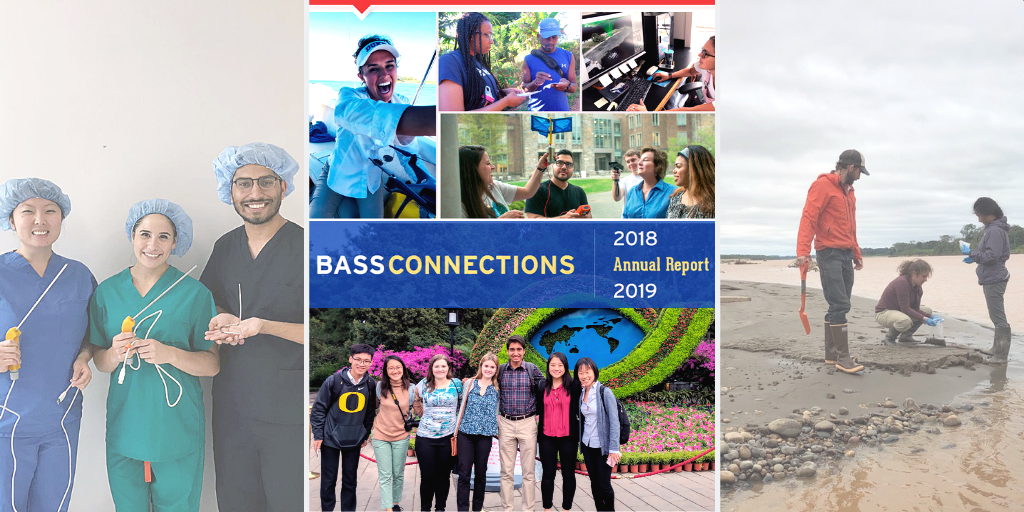Innovate, Evaluate, Refine, Share: Highlights from Bass Connections
A group of students hikes up a mountain in Nepal to help villagers assess hypertension. Two undergraduates attend an oral argument at the U.S. Supreme Court, hearing how their research has shaped a landmark case on partisan gerrymandering. A student digs through the Durham Public Library to uncover how race affected local tuberculosis patient care before World War II. A team investigates seeds collected from elephant dung samples in Gabon. Another student discusses critical thinking skills with second graders at a local public school.
These Duke students are engaged in wildly different kinds of research, reflecting the many ways that Bass Connections teams cross disciplines, whether to pursue data analysis, archival research, laboratory studies, pilot interventions, policy analysis, prototyping or fieldwork. Even with all this variety, these students are developing a common set of capacities – facility in tackling complex, large-scale problems by defining and scoping out research questions; the knack of working within diverse teams and communicating across disciplinary boundaries; and the flexibility to adjust course in the face of adversity.
As we have seen the Bass Connections model thrive throughout our six-year history, we have sought to innovate, evaluate, refine and share. We are thrilled to share these highlights from the past year:
Innovate
We created Bass Connections Open – an experimental channel that welcomes faculty to propose projects that don’t align with one of our five themes but otherwise fit our model. The nine teams selected through this channel tackled issues ranging from sexual assault on college campuses, to healing and resilience for adult survivors of childhood cancer, to the buried intellectual history of early modern female philosophers.
Evaluate
Many of the projects we supported in the first few years of Bass Connections have taken root, yielding productive research partnerships and seeding new opportunities. Our growing number of alumni have also leveraged their capacity for problem-solving into diverse careers. To better understand these long-term outcomes, we launched a multiyear evaluation effort to track the program’s enduring impact on faculty research, student trajectories and community partners.
Refine
When we see common challenges across teams, we address them systematically. In response to growing evidence that teams benefit from assigning someone (often a graduate student or postdoc) to serve as a project manager, we have encouraged adoption of this role – 85% of our teams now have such a position, and team leaders link this structure to project successes. We have also partnered with the Duke Project Management Community of Practice and Duke Libraries to provide training and resources to share best practices.
Share
As we learn from our own efforts, we share these lessons with other schools interested in models for team-based, applied research, ranging from high schools to community colleges to international research universities. At the same time, we have engaged with similar programs elsewhere to take advantage of their insights and best practices. We plan to accelerate this knowledge exchange in coming years by increasing the number of project teams involving faculty and students from partner institutions.
Read the Bass Connections 2018-2019 Annual Report.
Of course, programs like Bass Connections cannot exist, let alone thrive, on their own. We extend our appreciation to the many faculty, staff, administrators, students, external partners and donors who propel this program forward.
Edward Balleisen, Vice Provost for Interdisciplinary Studies
Laura Howes, Director, Bass Connections
Learn More
- Students, faculty and potential partners, find out how to get involved in Bass Connections.
- See the RFP for 2020-2021 Bass Connections projects and submit a proposal by November 4.
- Apply for a Collaborative Project Courses Faculty Fellowship by October 15.
